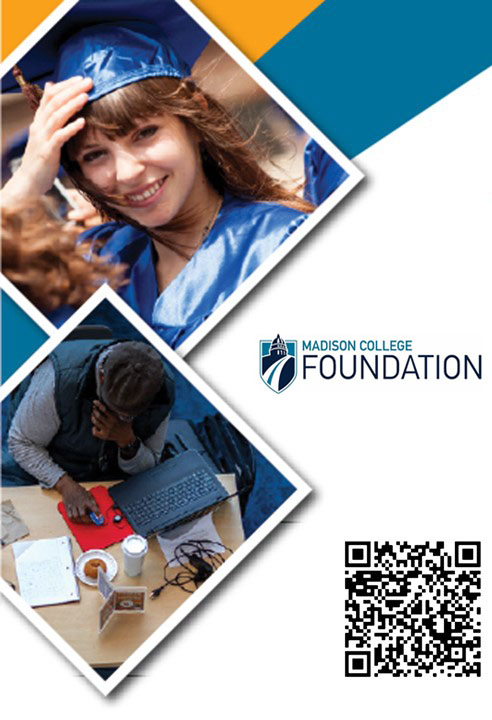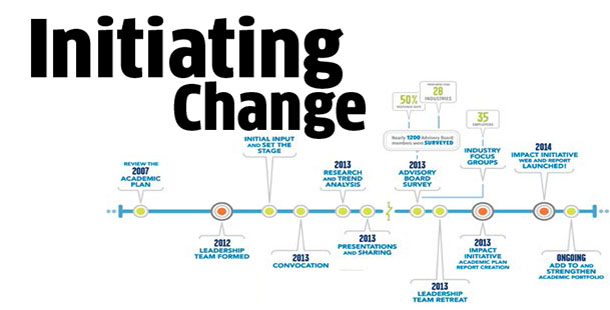It’s reflexive. It’s adaptive. It’s responsive.
It’s the 2014-2018 Madison College Impact Initiative.
This academic plan is coming at a time when such documents typically collect dust on a shelf. Earlier this year, a highly talented and innovative group of Madison College faculty, staff and students got together to create the document. They wanted to ensure that it would become reflective of the College’s resilient environment and applicable to the life of every Madison College stakeholder.
“The Impact Initiative is Madison College’s academic plan, which is essentially a guiding strategic document, based on data that is going to help our college build systems and processes and academic products that are as connected and relevant to the marketplace as
possible,” said Turina Bakken the College’s associate vice president of Learner Success and spearheading administrator for the Impact Initiative.
A PDF version of this document recently became available online and the fully-developed, interactive website will be available in mid-April.
In the past – and even in the present for many institutions – academic plans are long, wordy documents that are the product of hours of research and compilation with little return in terms of readership and inspiration generation. Bakken and her team of research, writing and design experts set out to create a plan that could actually be used by the people that depend on Madison College.
The Content
The Impact Initiative is a 120-page document with a focus on six principle themes: Academic Technology, Changing Credentials, Flexible Delivery, Workforce Skills and Jobs of Tomorrow.
While this academic portfolio presents a lot of vital research that is specific to Madison College, that’s not all it’s about. The Impact Initiative also reports on information gathered from professionals in 28 industries across the area about what they are looking for in future employees.
Bakken can see that students will benefit from many components of the plan. With sections that discuss information about core workforce skills, changing credentials and modularizing your degree, students have the chance to gain reliable information about how to make themselves more marketable.
Kathleen Paris, who was involved with facilitating an early planning session for the Impact Initiative, thinks that students can rest assured that their education is in good hands by looking at this document.
“These changes that we’re making are shaped to adapt to the workforce need and will help them as far as their employability,” Paris said.
One thing the team found was that employers in today’s marketplace hold core workforce skills like self-management, communication and critical thinking at an extremely high standard. In fact, in three focus groups, basic professional skills were mentioned 93 times.
While this information is really interesting reading material, this is not it’s only purpose. The data was compiled so readers can use it in their daily lives.
The Application
“We wanted to create more of a living document, more of an idea platform,” Bakken said.
The document’s unique layout and downloadable content allow students, faculty, staff and external stakeholders to use the entire document, or just certain pieces, any way they please. The infographics are individually downloadable and customizable so that they can be used in presentations, posters and documents.
The Links and Resources section of the Impact Initiative states that readers are free to share and adapt the material so long as they give proper attribution and refrain from using it commercially or changing any licensing restrictions.
The Team
Bakken said one of the most rewarding aspects of creating this document was the cross-functional group of people with whom she had the chance to work. This group included faculty, administrators, students and staff in areas from Institutional Research Effectiveness (IRE) to advising.
Once research and writing was compiled from across the college, it was up to a set of rockstar designers to make the document unique, multidimensional and flexible for the diverse Madison College population. The design team, led by consultant and part-time instructor Nichie Bendt, included two students, Holly Whitleff and Kelly Gutt, and an alumnus, Jamie Gotkowski.
“The people at this College – including students – are so talented that when you pull together the right people with the right talent and you include people in the right way, this is the result,” Bakken said.
The Progress
Those involved with creating the Impact Initiative found that, when they looked at the work that goes on here, this institution is increasingly competitive in a number of areas.
The Impact Initiative mentions that 39,055 degree and non-degree students of vast diversity attended Madison College in the 2012-2013 academic year. Of those students, 67 percent are upward of 23-years-old, which expresses an increasing demand for post-baccalaureate and job-training courses.
They found that nine out of 10 students found face-to-face interaction extremely important, but they also expect instructors to utilize technology in and outside the classroom. The report looked into how Madison College has addressed those needs with hybrid, online and flipped classes.
The Impact Initiative, in itself, is a representation of the progress that the College has made. Paris thinks it is a fantastic recruitment tool for prospective students and employees.
“This is what our students do and this is what they can create,” she said, “It’s just a huge advertisement of the competence of our students and the fact that this place is a contemporary institution.”
The Opportunity
Bakken knows that while the college is consistently ahead of the curve in many areas, there is always room for improvement in this changing world.
“We rebranded it the Impact Initiative because we really wanted it to be representative of action and positive change, not just planning. Because planning without action is … it’s just planning,” she said.
The team identified areas in which the college could improve its offerings and support. These areas were streamlined into what’s called “The Big 6” – six priority projects intended to improve the Madison College experience. They also identified areas of instruction that they hope to expand on in the future. These “Programs of Promise” include improvements for disciplines from gerontology to aviation.
Impact Teams will be created to take action on the issues addressed in the plan. With this document as a launching point, the College has the opportunity to make positive changes in the years to come and to include students in the decision-making process. “I don’t think you’ll find anything else like this out there and the fact that our students helped build it really says something about the quality of our instructors and the quality of this institution, but really about the caliber of students that we have here,” Bakken said.


























